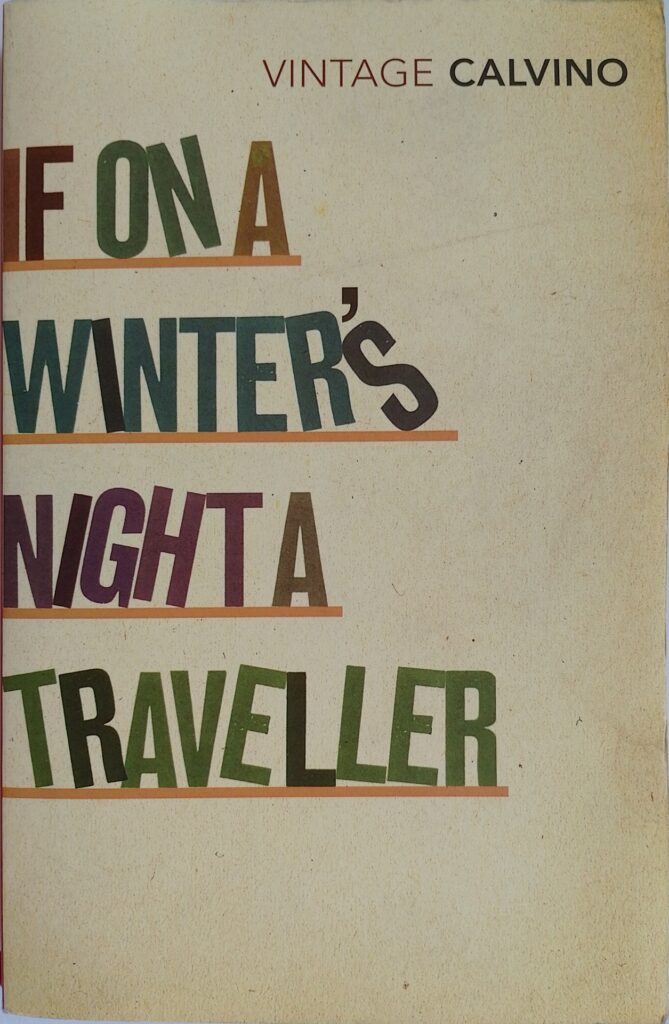If on a Winter’s Night a Traveller by Italo Calvino
First published 1980. Vintage paperback, 1998, translated by William Weaver, pp 260, c.80,000 words.
This is an experimental work. Although couched as fiction, it is more a thought experiment on the relationship between writer, reader and text. There are ten incomplete short stories, unrelated in terms of plot but linked by intervening essays and a cast of characters of writers and readers who are all aspects of the author’s own thought processes. The protagonist of the stories is us, the reader. The narrative, such as it is, might be described as being how the protagonist on encountering a book and becoming absorbed in it, then discovers that there has been a printing mistake, or the book is lost somehow, and therefore the reader is continuously frustrated, having become absorbed in turn in each story’s plot. This authorial arrogance: there is much use of ‘you’, in how he anticipates a reader will respond to his work. There is no great insight here, but a degree of self-knowledge that his work will not be to many people’s tastes. He gets his punches in early, rubbishing not only readers but publishers, translators and other writers. ‘She said that when Manara convinces her that the difference between the true and the false is only a prejudice of ours, she feels the need to see someone who makes books the way a pumpkin vine makes pumpkins’ [p152].
Undoubtedly Calvino is a very clever chap and clearly understands all the frustration and dissatisfaction that a broken story has on the reader. He is also capable of at least starting a short story that fully engages. But does this add up to something worth reading? I very nearly gave up about ten pages in when I realised that the story was going nowhere. To a degree I’m sorry that I wasted my time by continuing. The author amazes by his arrogance in assuming that we would be interested in his search for the perfect reader, or explaining his frustrations that someone who writes high-brow literary works has lower sales than someone who writes entertaining and informative stories that explore the human condition.
The stories mainly revolve around men encountering women, and their desire to possess them: one male addressing another in typical late 20th century fashion. A couple of the stories are mildly erotic, one an evocation of a 19th century Japanese print: a Hokusai floating-world picture rendered in prose. Others concern Kafka-esq bureaucracies and spy-counter-spy stuff that border on the silly: characters piling alias upon alias, and given ‘funny’ names, e.g. Professor Uzzi-Tuzii, Ukko Ahti, Vorts Viljandi. The ‘girl’ is usually given the name either Lotaria or Ludmilla, who may also be sisters.
Sometimes this comes across as a stream-of-consciousness piece, only too self-aware: ‘Whatever it may be, this is a novel where, once you have got into it, you want it to go forward, without stopping.’ [p76] (except I didn’t, I wanted it to end as quickly as possible) or ‘putting behind you pages lacerated by intellectual analyses, you dream of rediscovering a condition of natural reading’ [p92], which he then goes on to call innocent and primitive, but that I would call skilled and deep; or ‘These pages I am writing should also transmit a cold luminosity, as in a mirrored tube, where a finite number of figures are broken up and turned upside down and multiplied.’ [p163]. There is much use of the kaleidoscope in the second half of the book as a rather obvious metaphor for all that it amounts to.
Some of the language used here shows a remarkable command of writerly technique (and translation): ‘the echo of a vanished knowledge revealed in the penumbra and in tacit allusions.’ [p68]. One only wishes that that skill was used on a better project. Calvino is his own critic: ‘The writer has good technique and a certain elasticity of ideas.’ [p184]
Calvino also has a crack at publishers, biting the hand that feeds him with an amusing aside: ‘The corridors of publishing houses are full of snares: drama cooperatives from psychiatric hospitals roam through them, groups devoted to group analysis, feminist commandos.’ [p95]
The translation is in excellent literary English. It reads very smoothly.
This is one you are going to either love: it is very clever and might make a worthy study for a European Literature undergraduate class; or hate: it goes nowhere as a story, is rather dated self-indulgent tosh and should never be described a as a novel.
Wikipedia biography of Calvino: https://en.wikipedia.org/wiki/Italo_Calvino
Wikipedia summary of the book: https://en.wikipedia.org/wiki/If_on_a_winter%27s_night_a_traveler
Others’ reviews of the book: https://www.goodreads.com/book/show/374233.If_on_a_Winter_s_Night_a_Traveler?ref=nav_sb_ss_1_16
© William John Graham, July 2023

